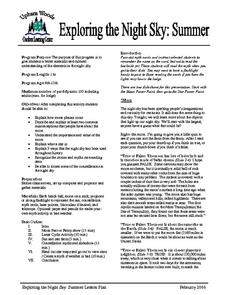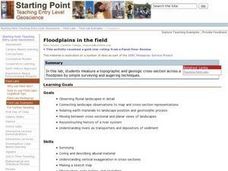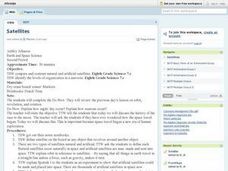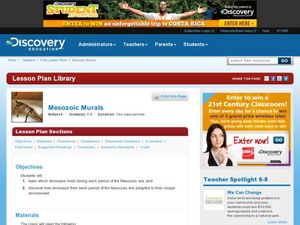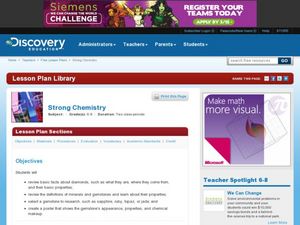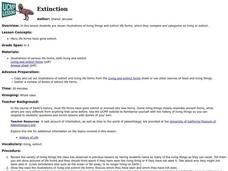Curated OER
Exploring the Night Sky: Summer
Students explain how moon phases occur. They describe and explain at least two common misconceptions that people have about the moon. Students explain what a star is. They explain 3 ways that the night sky has been used throughout history.
Curated OER
Meet Geodesy-The Science Behind GPS
Learners discover how a datum of reference points are used to to describe a location. In this Earth Science lesson, students will simulate how a GPS accurately determines the location of reference points within a datum.
American Museum of Natural History
What do you Know About Climate Change?
Test the class's knowledge of the key components of climate change. A 10-question online quiz asks learners about weather, climate, greenhouse gases, and several other concepts related to climate change. Interactive and easy for...
GNS Science
Think like a Geologist: 1
How well do pupils play the role of geologist? Test their abilities in the first installment of a two-part series. Presented with a series of rock formation diagrams, learners write stories to match what they see in the diagrams. The...
Curated OER
Using Soil properties and Vegetation Differences to Hypothesize the Land Use History and Topographic Differences between Two Locations
Ninth graders take soil samples and perform tests on these samples.
Curated OER
Exploring the Night Sky: Fall/Winter
Students explain how moon phases occur. They explain three ways that the night sky has been used through history. Students locate some of the constellations in the night sky. They discuss stories and myths surrounding stars.
Curated OER
Earthquakes and Volcanoes
In this earthquakes and volcanoes activity, students will review how volcanoes are formed and where they are found. Students will describe earthquakes and their magnitudes. Students will use a table to answer questions about tsunamis....
Curated OER
Evolution and Geological Time
In this evolution activity, students review the geological time scale and how evolution has taken place over time. This activity has 13 fill in the blank questions.
Curated OER
Floodplains in the Field
Students measure a topographic and geologic cross-section across a floodplain using simple surveying and auguring techniques in a field lab. Students also reconstruct the history of a river system.
Curated OER
Present-Day Rapid Extinctions
For this extinction worksheet, high schoolers review the different human activities that are leading to present-day rapid extinctions. This worksheet has 9 short answer questions.
Curated OER
Volcano
Pupils research major volcanic eruptions. In this Earth science instructional activity, students take on the role of vulcanologist writing reports to the President of the United States on how to respond to a volcanic disaster. This...
Curated OER
Satellites
Eighth graders explore the history of space travel and satellites. Through a teacher demonstration, 8th graders observe how a satellite revolves another object. They identify natural and artificial satellites, explore how satellites...
Science Matters
Spaghetti Fault Model
Does increasing the pressure between two moving plates provide a stabilizing force or create more destruction? The hands-on lesson encourages exploration of strike-split fault models. The sixth lesson in a 20-part series asks scholars to...
Monroe City Schools
Clouds! Clouds! Clouds!
Here is a beautiful instructional activity on clouds designed for your 1st graders. Learners study three different types of clouds. They construct drawings of cumulus, cirrus, and stratus clouds. The Cloud Book, by Tommie dePaola is used...
Curated OER
Understanding the Water Cycle
Investigate the water cycle and how water moves from the land to the air and back to the land. Create a terrarium and observe the water cycle at work. Define weather terms including evaporation, condensation, and precipitation.
Curated OER
Modeling Geologic Time
Pupils design, construct and interpret a model of geologic time and investigate change through geologic time.
Curated OER
Acid Neutralization Lab
Learners discuss and design a lab to measure pH of limestone, pyrite, limestone-pyrite mixtures and their control. They have their labs approved by the instructor before they begin. Students preform the lab and explore the acid-base...
Curated OER
Mesozoic Murals
Middle schoolers create a mural of one of the Mesozoic Periods. For this geologic timeline lesson, students will research the plants and animals that lived in the Mesozoic Era in order to create a mural to scale that represents one of...
Curated OER
Elders' Weather Forecasting
Students interview an Elder to determine ways of forecasting the weather. In this weather lesson, students use the information from an interview to make a weather prediction.
Curated OER
Strong Chemistry
Students research and create a poster about a gemstone. In this mineral properties lesson, students view a video about diamonds. They discuss the properties of minerals and choose a gemstone to research and create a poster.
Curated OER
Extinction
Students peruse illustrations of living things and extinct life forms, which they compare and categorize as living or extinct.
Curated OER
Glacial Geology in the Field
Students examine the origin of glaciers, how glacial sediments are deposited, and what sedimentary records of glaciation provide about source and process of glaciers in a field lab.
Curated OER
Weather Myths
Fourth graders examine myths that are based on weather phenomenon. They write, illustrate and present an original weather myth.


